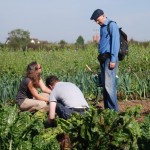RESEARCH & EVALUATION TOOLS and SERVICES
f3 has developed a portfolio of tools and templates to expedite market research, and has extensive project evaluation experience.
These tools are used in many of our service areas, or can be utilised for specific market research and analysis requirements.
Our tools and services include:
- Evaluation of sustainable food initiatives
- Market research survey templates
- Bespoke survey design and participatory models
- Business planning and financial forecasting templates
- Statistical analysis
Local Food - an evaluation of the Lottery programme
 The Local Food programme, which ran from 2011-15, was a £60m Lottery fund to assist community food enterprises in England. f3, in partnership with CCRI, carried out the programme evaluation.
The Local Food programme, which ran from 2011-15, was a £60m Lottery fund to assist community food enterprises in England. f3, in partnership with CCRI, carried out the programme evaluation.
It examines the extent to which the programme has addressed its over-arching aim and five main themes. The report concludes by reflecting on how well the programme has achieved what it set out to do, and makes some recommendations for the future of local food projects. A key reflection was that:
“Local Food projects are being used as a vehicle for facilitating wider societal changes to take place, with the funding from Local Food intended to act as a catalyst and enabler for positive change within communities.”
See Summary Report
SME Short Supply Chain Review tool
 This tool helps to assess SME impacts and benefits on their own food supply chains, with a view to capture baseline data and supporting and identifying potential improvements.
This tool helps to assess SME impacts and benefits on their own food supply chains, with a view to capture baseline data and supporting and identifying potential improvements.
It aims to enable the SME to look in more detail at its own supply chain impacts and decide which considerations matter most to their business and are therefore useful to measure. It makes some suggestions as to what might be measured and how, though the main purpose is to stimulate the SME to decide for itself what the most useful measures would be.
There are three main areas of analysis, all of them based on the perceived benefits of short supply chains and directly related to the efficiency and impacts of short food supply chains:
- logistics efficiency and sustainability (activities relating to reducing transportation costs and impacts, improving fuel efficiency and waste management)
- involvement in the local economy (farm or business contribution to building a vibrant local economy through cooperation with other local businesses, attention to local employment and food chain localisation, and other form of economic engagement at the local level)
- relationship with local community (farm or business engagement with local people and other activities that contributes to strengthen a vibrant local community, beyond economic impacts).
See introduction to WP5 Summary of tools in SupurbFood project
Evaluation and Options for Community Growing Initiatives in Sandwell
 Sandwell has a national reputation for its health-driven community food growing initiatives.
Sandwell has a national reputation for its health-driven community food growing initiatives.
The work of Growing Opportunities which has led the projects, was part funded by the Primary Care Trust and now the local Council. However, current pressures on public funding have meant that core funding has come under serious review.
This study was commissioned with a view to reviewing impact to date, and identifying the options the Council has in supporting community food programmes. In carrying out this work the consultants were asked to consider the effect of a reduction, perhaps to zero, in core funding for Growing Opportunities from the Council; or if funding is to continue, how it can be shown to be effective and good value for money in delivering local priorities in terms of public health and well-being.
The study has considered the potential future of community based growing in Sandwell in the round, and noted its potential as a vehicle for creating diverse benefits including employment and skills development, enterprise and job creation, urban land regeneration, public health and wider health outcomes.
See Sandwell Options Appraisal summary
Market Research tools
 Over the years, f3 has developed a number of effective market research tools. Most are now held in an online format, although phone based surveys can feed into this. The online format enables data analysis, to provide intelligent reporting on market and supply chain issues. The tools include:
Over the years, f3 has developed a number of effective market research tools. Most are now held in an online format, although phone based surveys can feed into this. The online format enables data analysis, to provide intelligent reporting on market and supply chain issues. The tools include:
- producer surveys – identifying what is being produced in a defined area, supply chain issues, and how local businesses hope to develop including approaches to collaboration
- distribution surveys – exploring existing distribution infrastructure, and opportunities for new collaborative systems
- retail and hospitality surveys – exploring the demand for local and sustainable food, the specific needs and issues for buyers, and how short supply chain links can be established
- consumer surveys – helping identify what local consumers are really looking for, and what they will do in practice (which can be different!), and how to establish more direct trading with local producers
- waste surveys – identifying what happens to waste in production, in the supply chain, and post consumer, and how this can be minimised or recycled

